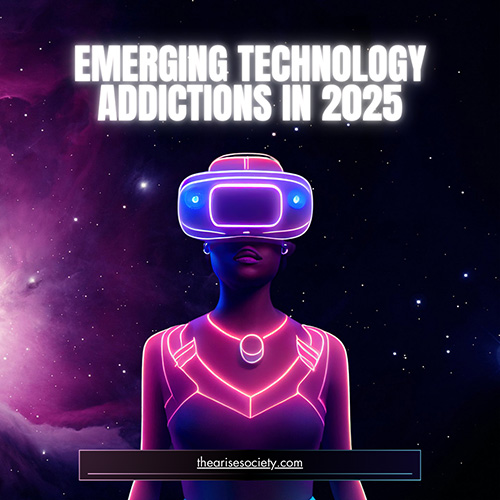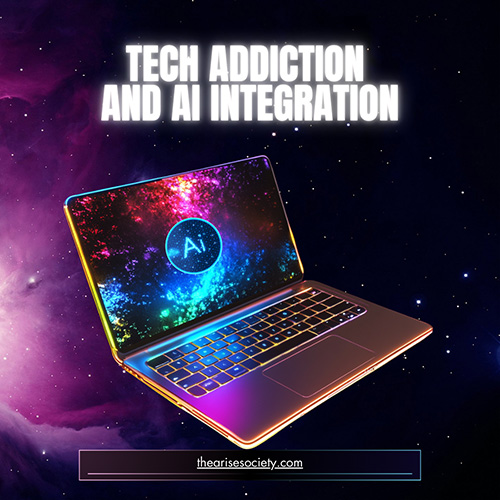As we navigate the ever-evolving digital landscape, concerns about Technology Addiction in 2025 are becoming increasingly pressing. Emerging technologies like artificial intelligence (AI) are transforming the way we interact with the world around us, but they also pose significant risks of addiction.
AI Addictions in 2025
 Personalization AI assistants
Personalization AI assistants
Tailored interactions and content can enhance user engagement along with potentially addictive behavior. By offering personalized recommendations and continuous interaction, these tools can subtly increase dependency as users rely on them more for daily tasks and decision-making.
AI-Driven Relationships
A fascinating trend is emerging where individuals are forming deep emotional connections with AI systems, such as chatbots like ChatGPT. This phenomenon is exemplified by stories of people customizing AI to act as romantic partners, creating a sense of companionship and intimacy. For instance, Ayrin, a woman featured in a recent New York Times article, developed a romantic relationship with an AI persona named Leo, which she created using ChatGPT. She customized Leo to be dominant, possessive, and protective, and their interactions evolved into a complex emotional bond. This trend highlights how AI is not only changing how we interact with technology but also influencing our personal relationships.
Listen to The Daily podcast episode about Ayrin and her AI boyfriend, Leo here:
Tech Addiction and AI Integration
The integration of AI into daily life is also contributing to a cycle of addiction. AI-driven algorithms, often used in social media and other digital platforms, are designed to capture and retain user attention, leading to an addiction cycle that can result in significant mental health impacts, such as depression and dissatisfaction. The use of AI for personalized interactions, whether in chatbots or virtual assistants, can enhance user engagement but also increase dependency. As AI becomes more pervasive, understanding its impact on our behavior and relationships is crucial. The normalization of AI companionship, as predicted by experts, suggests that these trends will continue to evolve and shape our understanding of technology’s role in our lives.
Mental Health Concerns
The overuse of AI-driven platforms can contribute to mental health issues such as anxiety and depression. Users might feel isolated or less capable as they rely increasingly on machines, which can lead to a deterioration of their natural social and cognitive skills
Statistics on Addictive Technologies in 2025
 Top Most Addictive Technologies
Top Most Addictive Technologies
- Smartphones:
- Over 399 million people worldwide are affected by smartphone addiction.
- Americans use their phones for nearly three hours per day.
- The average American checks their phone over 96 times daily.
- Social Media:
- TikTok is highly addictive, with 46% of U.S. teens using it almost constantly.
- Instagram is also addictive, with 70% of young adult women reporting feelings of addiction.
- Social media platforms like Facebook and Snapchat are similarly addictive, with users spending significant amounts of time on them daily.
- Video Games:
- Approximately 105.6 million gamers worldwide are considered addicted to video games.
- The gaming industry is seeing a rise in addiction, particularly with the integration of AI and VR technologies that enhance engagement.
- Internet:
- About 6% of the global population is addicted to the Internet, with 25% of teenagers showing signs of dependence.
- The Internet’s accessibility and instant information make it highly addictive.
Emerging Trends in Tech Addiction
- Games and AI Integration: As Games become more integrated with AI, the potential for addiction may increase due to enhanced realism and engagement.
- Metaverse and Immersive Technologies: The metaverse, with its immersive virtual environments, is likely to pose significant addiction risks as it becomes more mainstream.
By focusing on these aspects, you can create a comprehensive discussion on emerging technologies, their potential for addiction, and how AI integration in VR is changing the landscape of immersive experiences.
AI Deep Fakes and Reality Distortion
Challenges
Deepfakes and Reality Distortion: Advances in AI have brought about the threat of deepfakes and reality distortion. These technologies challenge trust and perception, complicating the issue of distinguishing true experiences from fabricated ones. Such distortion can amplify addiction as individuals seek refuge in manipulated realities rather than facing their complexities.
Solutions
Education and Awareness: Proactive educational initiatives can promote responsible usage of technology, teaching users to recognize and control addictive behaviors. Digital literacy programs can equip individuals with the knowledge to navigate digital environments healthily.
Therapeutic Approaches: Digital detox programs and therapy sessions can help manage technology addiction. These approaches focus on reducing screen time, fostering in-person interactions, and developing offline hobbies and interests.
The Role of The Arise Society
Addressing Young Adult Challenges: The Arise Society in Utah actively supports young adults dealing with technology addiction and motivational challenges. With a holistic approach, they provide guidance tailored to individuals’ needs, helping them regain control over their lives.
Therapeutic Interventions: The Arise Society helps individuals build healthier relationships with technology by offering personalized treatment plans and fostering a supportive community. Their programs teach essential life skills and resilience, preparing students for sustainable success.
Conclusion – Technology Addiction in 2025
Addressing technology addiction is crucial as we move further into the digital age. Communities and organizations like The Arise Society play a vital role, offering support and resources to manage and overcome these challenges. We invite readers to reach out for assistance, ensuring that together, we can tackle technology addiction effectively and foster healthier digital interactions.
FAQs – Technology Addiction in 2025
-
What is AI dependence, and how does it relate to mental health?
-
AI dependence refers to excessive use of AI technologies leading to dependence and addictive behaviors. This can have negative consequences, such as interpersonal problems and mental health distress, including anxiety and depression. Mental health issues like depression and anxiety can predict AI dependence, as individuals may use AI to self-medicate emotional problems1.
-
-
How does VR addiction manifest, and what are its potential risks?
-
VR addiction involves compulsive and harmful use of immersive virtual reality devices, leading to neglect of personal hygiene, nutrition, and physical health. It can also cause feelings of isolation and emotional absence. The immersive nature of VR can increase psychological rewards, potentially leading to addictive use, especially with enhanced feelings of embodiment.
-
-
What are some common signs of technology addiction?
-
Common signs of technology addiction include spending excessive time on devices, feeling uneasy without access to technology, neglecting real-life responsibilities, and experiencing changes in sleep or eating patterns. These behaviors can mirror those seen in other addictive disorders.
-
-
How does AI integration in VR enhance addiction potential?
-
AI integration in VR can enhance addiction potential by creating more realistic and interactive experiences. AI-driven NPCs can adapt to user behavior, making interactions more engaging and personalized. This increased realism and interactivity can lead to deeper immersion and potentially more addictive behaviors.
-
-
What are some emerging trends in technology addiction, particularly with AI?
-
Emerging trends include the formation of emotional bonds with AI companions, which can lead to dependency and addiction. AI’s ability to generate personalized content and provide constant support can create an “echo chamber of affection,” threatening to replace human relationships and lead to what is termed “digital attachment disorder”
-


 Top Most Addictive Technologies
Top Most Addictive Technologies